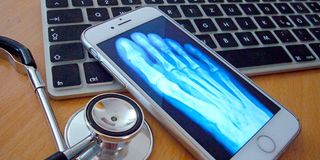
Kenya should focus on the provision of healthcare in a more effective, efficient and cost-effective manner by adopting digital health.
I have suggested in this column before that what needs to change in order to improve healthcare in Kenya is not NHIF but the culture in public hospitals. What the new body, SHIF, will do is not dissimilar from NHIF, apart from making changes to contributions, something the latter is still capable of.
The country should focus more on the provision of healthcare in a more effective, efficient and cost-effective manner.
One of the ways should be the adoption of digital health. Many hours are wasted by patients and healthcare professionals in face-to-face consultations and travelling long distances to hospitals. There are many conditions and illnesses that could be dealt with promptly by phone or online consultations.
As one of the countries with large penetration of high-speed internet, Kenya is ripe for digital health. There is no need to hang onto the traditional form of medical consultations unless it is necessary for patients to be physically seen by a doctor. Digital and telephone consultations will ease up time for doctors in main hospitals to deal with critically ill patients and open up more space for in-patients.
It is commendable for the government to adopt drone technology to fight malaria, but the same technology could be used to transport much-needed medication and for diagnostic purposes in far-flung areas. In fact, drone technology and digital health should now be part and parcel of health provision in the country.
Funding
However, funding and staffing, which is crippling public hospitals, need to be addressed if technology in healthcare is to succeed. Knowing how some of the counties work, they may now rush to adopt technology in hospitals but still fail to employ key workers needed to drive healthcare. It is a shame that doctors and nurses still beg to be employed in a country with a poor healthcare system.
In fact, I could argue that our healthcare system is not poor but impoverished by corruption in the counties. The more reason that healthcare now needs to be nationalised and digitised is to help Kenyans who are drowning in debt from unpaid medical fees and dying from preventable diseases.
The crucial thing that is not happening and needs to commence is the sharing of medical notes by patients. Digital health should ease this if patients are given access to their e-medical reports. The illiterate patients could be given theirs in writing so that family and friends can help them with it.
Sharing of medical notes with patients is something that will tackle cases of negligence and increase accountability in the hospitals, both private and public. Some doctors have played God when it comes to patient care, especially in public hospitals, without any ramifications for their mistakes. This is something that, hopefully, digital health and medical note-sharing with patients will end.
Remote consultations
Adoption of technology and remote consultations will require investment in computers in hospitals for these purposes. Kemsa didn’t cover itself in glory previously due to corruption but, moving towards supporting hospitals to digitise will, hopefully, vindicate it. For that matter, it would be important for the government to focus on digitisation of healthcare to improve patient care and experience.
A lot of energy is being spent on chasing up contributions to the health insurance funds. However, the contributions need to be matched by contributions from the government in infrastructure and modernisation.
M-Pesa technology is a digital revolution that turned traditional banking on its head and made Kenya the envy of the world. Digital health could have similar success, given the spread of usage of mobile phones in the country. Communities that live far from main hospitals should be able to have the same opportunities for medical consultations as their counterparts in the cities with telephone and video consultations.
Corruption is expected to hover over any new medical system. However, computerisation should make it easier to audit activities in hospitals and the behaviour of medical professionals. Storage of medical reports will also improve if we transition from paper- to computer files. All these changes will only succeed with enough human resource to drive universal healthcare.
Crumbling medical system
A country with a crumbling medical system does not need medical graduates as interns but as doctors and nurses working from day one. It is foolhardy to rush and buy all the technology in the world but fail to employ doctors and nurses.
The conversation we should have shouldn’t be just about the type of patients’ contribution or dropping of NHIF but a medical system deserved a medical system that keeps abreast with the best in the world.
Kenyatta National Hospital, which is the main referral hospital and deems itself to be a ‘centre of excellence’ is still far from being referral if we are still stuck in Medieval times when it comes to provision of healthcare.
It is, therefore, time to bring in technology and digital health to help the country to achieve the universal health coverage that is modern, patient-centric and, hopefully, corruption-free.
Ms Guyo is a legal researcher, [email protected], @kdiguyo













